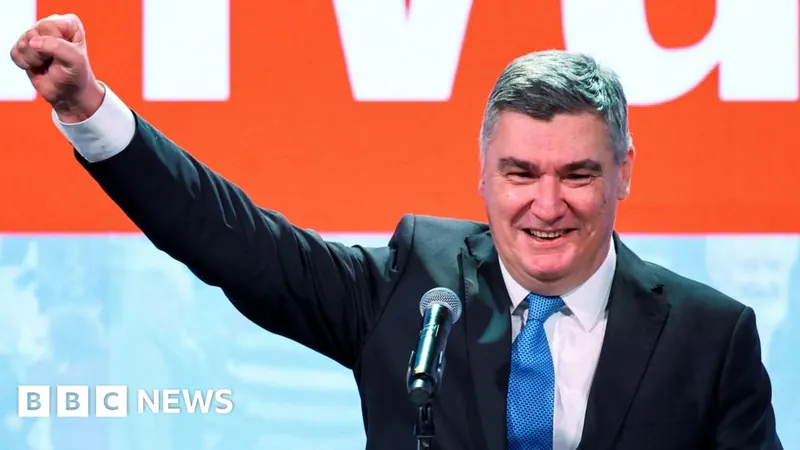
Zoran Milanovic Triumphs: A Groundbreaking Reelection Shakes Croatian Politics!
2025-01-13
Author: Wai
Introduction
In a stunning display of electoral support, Zoran Milanovic has been re-elected as Croatia’s president, claiming an impressive nearly 75% of the votes in a decisive presidential election. This landslide victory further solidifies his position as a pivotal figure in Croatian politics, sending shockwaves through the political landscape.
Election Results
Milanovic's opponent, Dragan Primorac, who garnered the backing of the ruling centre-right Croatian Democratic Union (HDZ), faced a disheartening defeat, securing only 25% of the vote. This outcome marked the poorest performance by the HDZ, the country's most influential political party, in its history since Croatia’s independence over three decades ago.
Political Reactions
The reaction from Prime Minister Andrej Plenkovic was notably subdued. He refrained from extending congratulations to the president-elect, claiming that 'Milanovic offers nothing' to the Croatian people. Despite this, Milanovic extended an olive branch, stating he was willing to 'offer a hand' to the prime minister in hopes of fostering collaboration.
Presidential Role and Criticism
In Croatia, the presidential role is largely ceremonial, with the constitution outlining that the president must not be a direct political figure but rather act as a representative for all citizens. However, Milanovic has not shied away from political discourse, openly criticizing the ruling party on various pressing issues such as corruption, inflation, and healthcare.
International Relations
While Milanovic condemned Russia's invasion of Ukraine, he also voiced reservations regarding Western military support for Kyiv, positioning himself uniquely in international relations. Before his tenure as president, he served as Croatia’s prime minister from 2011 to 2016 and led the centre-left Social Democratic Party (SDP) during the same period.
Past Political Ambitions
Last year, Milanovic attempted to re-enter the political fray by declaring his intention to run for prime minister in the parliamentary elections, but a court deemed his move unconstitutional. In his typical defiant style, he accused the judiciary of serving the interests of the HDZ, labeling it a 'gangster clique.'
Conclusion
As the HDZ has dominated Croatian politics since independence, this surprising reelection for Milanovic signals potential changes in the dynamics of power within the nation. With his presidency renewed, the question remains: how will he navigate the challenges ahead while maintaining a delicate balance between criticism and collaboration? Stay tuned for what could be Croatia's most intriguing political saga yet!


 Brasil (PT)
Brasil (PT)
 Canada (EN)
Canada (EN)
 Chile (ES)
Chile (ES)
 Česko (CS)
Česko (CS)
 대한민국 (KO)
대한민국 (KO)
 España (ES)
España (ES)
 France (FR)
France (FR)
 Hong Kong (EN)
Hong Kong (EN)
 Italia (IT)
Italia (IT)
 日本 (JA)
日本 (JA)
 Magyarország (HU)
Magyarország (HU)
 Norge (NO)
Norge (NO)
 Polska (PL)
Polska (PL)
 Schweiz (DE)
Schweiz (DE)
 Singapore (EN)
Singapore (EN)
 Sverige (SV)
Sverige (SV)
 Suomi (FI)
Suomi (FI)
 Türkiye (TR)
Türkiye (TR)
 الإمارات العربية المتحدة (AR)
الإمارات العربية المتحدة (AR)